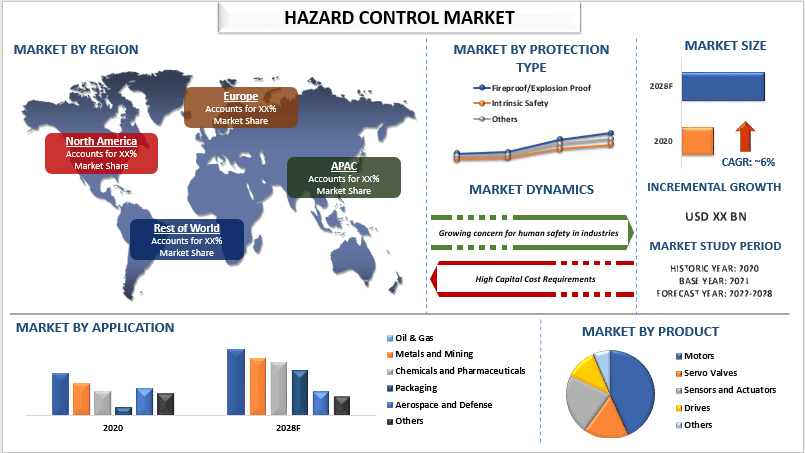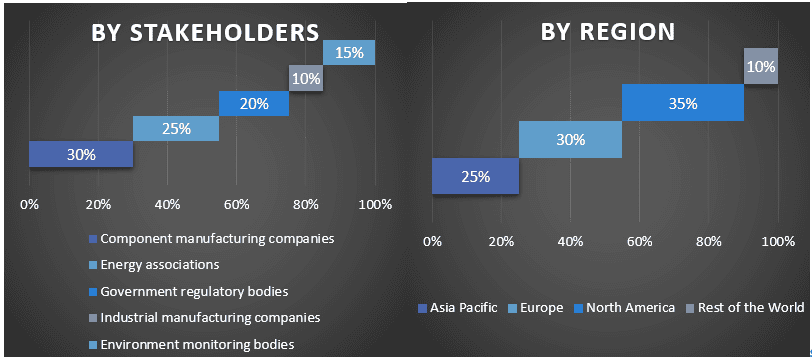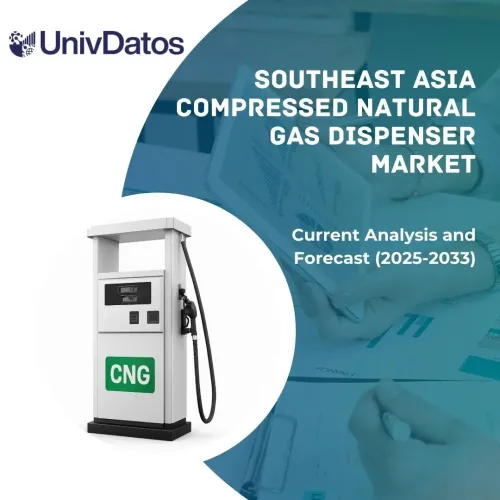- Home
- About Us
- Industry
- Services
- Reading
- Contact Us
Hazard Control Market: Current Analysis and Forecast (2022-2028)
Emphasis on Protection type (Fireproof/Explosion-Proof, Intrinsic Safety, Others); Product (Motors, Servo Valves, Sensors & Actuators, Drives, Others); Application (Oil & Gas, Metals & Mining, Chemicals & Pharmaceuticals, Packaging, Aerospace and Defense, Others); and Region/Country

The global hazard control market is expected to witness a CAGR of around 6% during the forecast period (2022-2028). As the market is anticipated to witness an uptick owing to stringent norms for industrial safety, increasing environmental concerns, and growing concerns for human safety in the industries.
In addition, major players such as Schneider Electric, Siemens AG, Emerson Electric Co., ABB, Rockwell Automation Inc, Eaton Corporation plc, AMETEK Inc, Magnetek Inc., Mitsubishi Electric Corporation, and Bei Sensors. Several M&As along with partnerships have been undertaken by these players to develop the hazard control market.
Hazard control is a program that consists of all necessary steps to protect workers from exposure to a substance or system or training and procedures required to monitor worker exposure and their health to hazards such as chemicals, materials or substances, or other types of hazards such as noise and vibration also needed to be controlled within the industry. In addition, risk assessment is involved to evaluate and prioritize the hazard and risk. Additionally, the major factors responsible for the growth of the hazard control market are stringent norms for industrial safety, the development of unconventional hydrocarbon resources, and growing environmental and human resource concerns for human resources safety in industries. The global hazard control market is expected to witness a CAGR of around 5.90% during the forecast period (2021–2027).
However, Covid – 19 has devasted the global economy due to which many sectors experienced a downfall as the demand for hazard control equipment got reduced within the industries due to their shutdown. But as the marine, oil & gas, petrochemical, and many others have been in process for a certain period, the concern towards human safety is gradually increasing to prevent human loss which is being into account with the help of hazard control monitoring devices depending upon the need of the industry.
Insights Presented in the Report
“Amongst protection, intrinsic safety category to hold a significant share in the market”
Based on protection, the market is fragmented into fireproof/explosion-proof, intrinsic safety, and others. In 2020, the intrinsic safety segment is seen as prominent in the growth of the hazard control market. Intrinsic Safety (IS) is an approach to the design of equipment going into hazardous areas. The idea is to reduce the available energy to a level where it is too low to cause ignition. That means preventing sparks and keeping temperatures low. In addition, IS devices have widespread application across all industries and in all types of hazardous divisions and zone classifications. Furthermore, increasing industrialization in the Asia Pacific will drive the demand for such devices during the forecast period.
“Amongst product, motors to hold a significant share in the market”
Based on product, the market is fragmented into motors, servo valves, sensors and actuators, drives, and others. In 2020, the motors segment is considerably going to grow in the hazard control market. Motors are utilized in a variety of applications, including industrial pumps, fans, and blowers. In addition, motors can operate in hazardous conditions, such as potentially explosive atmospheres, highly corrosive surroundings, and damp environments. As a result, the growing demand for motors from several Industries is expected to boost the market growth of hazard control during the forecasted period.
“Amongst application, oil & gas segment is accounted for a significant market share in 2020”
Based on application, the market is fragmented into oil & gas, metals and mining, chemicals and pharmaceuticals, packaging, aerospace and defense, and others. In 2020, the oil and gas segment is going to see a lucrative CAGR for the growth of the hazard control market. A focus on environmental protection and growing demand for hazard control from the oil & gas and chemical sectors is expected to drive demand for the hazard control market. In addition, governments and ruling authorities’ strict rules and regulations on industrial safety, along with the chemical and oil and gas industry’s adoption of unconventional processing methods, are driving the global demand for hazard control during the forecasted period.
North America to witness significant growth during the forecast period”
North America is likely going to dominate the hazard control market during the forecasted period. As many top hazard control market companies such as Siemens AG and Rockwell Automation, Inc. have implemented strict occupational safety regulations to limit the number of incidents, particularly on construction sites. The hazard control market is gaining traction due to its contribution to environmental protection. In addition, the resurgence of the mining industry in North America is expected to present attractive prospects for companies in the hazard control market. The development of unconventional hydrocarbon resources in the region, such as tight oil and shale gas, is expected to drive the hazard control market forward. Furthermore, to achieve self-sustainability, Mexico, Canada, and the U.S. are substantially investing in the oil and gas, mining, and food industries, which in turn, is expected to boost the regional market growth.
Reasons to buy this report:
- The study includes market sizing and forecasting analysis validated by authenticated key industry experts.
- The report presents a quick review of overall industry performance at one glance.
- The report covers an in-depth analysis of prominent industry peers with a primary focus on key business financials, product portfolios, expansion strategies, and recent developments.
- Detailed examination of drivers, restraints, key trends, and opportunities prevailing in the industry.
- The study comprehensively covers the market across different segments.
- Deep dive regional level analysis of the industry.
Customization Options:
The global hazard control market can further be customized as per the requirement of any other market segment. Besides this, UMI understands that you may have your own business needs, hence feel free to connect with us to get a report that completely suits your requirements.
Table of Content
Research Methodology for the Global Hazard Control Market Analysis (2022-2028)
Analyzing the historical market, estimating the current market, and forecasting the future market of the global hazard control market were the three major steps undertaken to create and analyze the adoption of hazard control in major regions globally. Exhaustive secondary research was conducted to collect the historical market numbers and estimate the current market size. Secondly, to validate these insights, numerous findings and assumptions were taken into consideration. Moreover, exhaustive primary interviews were also conducted, with industry experts across the value chain of the global hazard control market. Post assumption and validation of market numbers through primary interviews, we employed a top-down/bottom-up approach to forecasting the complete market size. Thereafter, market breakdown and data triangulation methods were adopted to estimate and analyze the market size of segments and sub-segments of the industry pertains to. Detailed methodology is explained below:
Analysis of Historical Market Size
Step 1: In-Depth Study of Secondary Sources:
Detail secondary study was conducted to obtain the historical market size of the hazard control market through company internal sources such as annual reports & financial statements, performance presentations, press releases, etc., and external sources including journals, news & articles, government publications, competitor publications, sector reports, third-party database, and other credible publications.
Step 2: Market Segmentation:
After obtaining the historical market size of the hazard control market, we conducted a detailed secondary analysis to gather historical market insights and share for different segments & sub-segments for major regions. Major segments included in the report as protection type, product, and application. Further country-level analyses were conducted to evaluate the overall adoption of testing models in that region.
Step 3: Factor Analysis:
After acquiring the historical market size of different segments and sub-segments, we conducted a detailed factor analysis to estimate the current market size of the hazard control market. Further, we conducted factor analysis using dependent and independent variables such as various protection types, products, and applications of hazard control equipment. A thorough analysis was conducted for demand and supply-side scenarios considering top partnerships, mergers and acquisitions, business expansion, and product launches in the hazard control market sector across the globe.
Current Market Size Estimate & Forecast
Current Market Sizing: Based on actionable insights from the above 3 steps, we arrived at the current market size, key players in the global hazard control market, and market shares of the segments. All the required percentage shares split, and market breakdowns were determined using the above-mentioned secondary approach and were verified through primary interviews.
Estimation & Forecasting: For market estimation and forecast, weights were assigned to different factors including drivers & trends, restraints, and opportunities available for the stakeholders. After analyzing these factors, relevant forecasting techniques i.e., top-down/bottom-up approach were applied to arrive at the market forecast for 2028 for different segments and sub-segments across the major markets globally. The research methodology adopted to estimate the market size encompasses:
- The industry’s market size, in terms of revenue (USD) and the adoption rate of the hazard control market across the major markets domestically
- All percentage shares, splits, and breakdowns of market segments and sub-segments
- Key players in the global hazard control market in terms of solutions offered. Also, the growth strategies adopted by these players to compete in the fast-growing market
Market Size and Share Validation
Primary Research: In-depth interviews were conducted with the Key Opinion Leaders (KOLs) including Top Level Executives (CXO/VPs, Sales Head, Marketing Head, Operational Head, Regional Head, Country Head, etc.) across major regions. Primary research findings were then summarized, and statistical analysis was performed to prove the stated hypothesis. Inputs from primary research were consolidated with secondary findings, hence turning information into actionable insights.
Split of Primary Participants in Different Regions

Market Engineering
The data triangulation technique was employed to complete the overall market estimation and to arrive at a precise statistical number for each segment and sub-segment of the global hazard control market. Data was split into several segments & sub-segments post studying various parameters and trends in the areas of various protection types, products, and applications in the global hazard control market.
The main objective of the global hazard control Market Study
The current & future market trends other than the global hazard control market were pinpointed in the study. Investors can gain strategic insights to base their discretion for investment on the qualitative and quantitative analysis performed in the study. Current and future market trends determined the overall attractiveness of the market at a regional level, providing a platform for the industrial participant to exploit the untapped market to benefit from a first-mover advantage. Other quantitative goals of the studies include:
- Analyze the current and forecast market size of the hazard control market in terms of value (USD). Also, analyze the current and forecast market size of different segments and sub-segments
- Segments in the study include areas of protection type, product, and application
- Define and analysis of the regulatory framework for the hazard control market industry.
- Analyze the value chain involved with the presence of various intermediaries, along with analyzing customer and competitor behaviors of the industry
- Analyze the current and forecast market size of the hazard control market for the major region
- Major countries of regions studied in the report include Asia Pacific, Europe, North America, and the Rest of the world
- Company profiles of the hazard control market and the growth strategies adopted by the market players to sustain in the fast-growing market
- Deep dive regional level analysis of the industry
Related Reports
Customers who bought this item also bought










